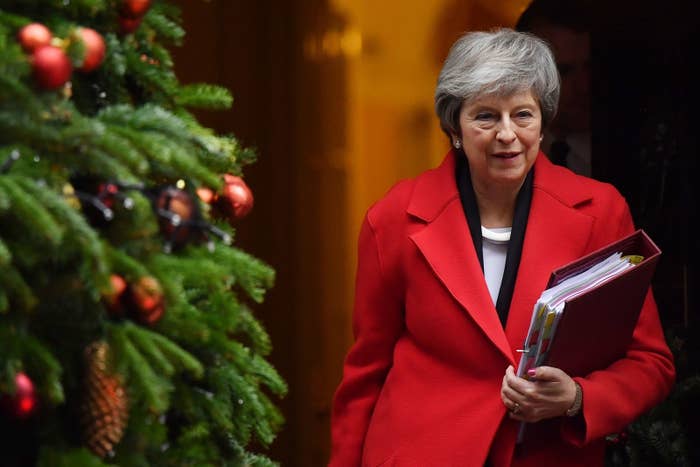
Theresa May’s Brexit deal could lock Britain into a customs arrangement with the European Union for “many years” and force Northern Ireland into a different regulatory regime, the UK’s senior law officer warned in an explosive assessment released by the government on Wednesday.
The six-page letter from Geoffrey Cox, the Conservative attorney-general, to the prime minister on November 13 will provoke more fury from opponents of May’s Brexit deal, including Leavers in the Tory ranks and Northern Ireland’s Democratic Unionist Party.
Nigel Dodds, one of 10 DUP MPs that May’s government has relied upon to prop up her fragile government in the House of Commons — and who are fervently opposed to her withdrawal agreement — described Cox’s advice as “devastating”.
Devastating legal advice from AG https://t.co/TBnbdPb9F1
Critics said the document, which parliament forced the government to release, confirmed their worst fears that the so-called Northern Ireland “backstop” will leave Britain in limbo long after it has formally left the European Union.
In some of the most contentious passages of the document, Cox said that the UK is likely to be indefinitely stuck in the backstop arrangement — under which the UK will remain in customs alignment with the EU until alternative permanent arrangements can be found — even if talks about a future trade deal have broken down.
Despite both parties saying the backstop will only be temporary, Cox said that it will “endure indefinitely until a superseding agreement took its place”. This would be the case “even if parties are still negotiating many years later, and even if the parties believe that talks have clearly broken down and there is no prospect of a future relationship agreement”.
An exit from the backstop would only be possible if the UK were to broker a separate political agreement with the EU in future, in Cox’s opinion.

Without a legal right to terminate the arrangement, Cox said, there is a risk that the UK “might become subject to protracted and repeating rounds of negotiations”.
Also of concern to critics is Cox’s contention that the backstop will mean that Northern Ireland is subject to a different regulatory regime than the rest of the UK, which would require checks on goods passing from the rest of Britain into Northern Ireland.
“Goods passing from GB to NI will be subject to a declaration process,” Cox wrote to the prime minister.
“The implications of NI remaining in the EU Single Market for Goods, while GB is not, is that for regulatory purposes GB is essentially treated as a third country by NI for goods passing from GB into NI,” Cox wrote. “This means regulatory checks would have to take place between NI and GB, normally at airports or ports, although the EU now accepts that many of these could be conducted away from the border.”
Cox’s legal advice sets out starkly some of the unpopular compromises May insists have been necessary to get an agreement with the EU. Ministers initially refused to publish the document, arguing that there was no precedent for the government to release confidential internal legal advice. It only agreed to do so after an unprecedented vote by MPs on Tuesday to hold the government in contempt of parliament.
In a statement, Dodds said the backstop is "totally unacceptable" to the DUP and would need to be defeated and renegotiated.
It would be "economically mad" to erect an internal trade barrier by allowing Northern Ireland to be governed by different regulatory arrangements, Dodds said.
He added: “This advice concisely sets out the stark reality of the operation of the backstop. Its publication demonstrates how the prime minister has failed to abide by the commitments she gave in that the United Kingdom as a whole would leave the European Union and that she would ensure there would be no customs or regulatory divergence within the United Kingdom.”
Sir Keir Starmer, Labour’s Brexit spokesperson, said the legal advice underlined “the central weaknesses in the Government’s deal”.
All week we have heard from Government ministers that releasing this information. could harm the national interest. Nothing of the sort. All this advice reveals is the central weaknesses in the Government’s deal. 2/3
